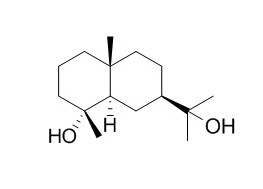Cryptomeridiol
Cryptomeridiol is a potential skin-whitening agent, exhibits melanogenesis inhibitory activity on α-MSH-stimulated B16 melanoma cells. Cryptomeridiol has low activity against A. niger, T. mentagrophytes, and C. albicans. (-)-Cryptomeridiol also exhibits a significant and concentration-dependent inhibitory effect on PAF receptor binding, with inhibitory concentration (IC)(50) values of 17.5 uM.
Inquire / Order:
manager@chemfaces.com
Technical Inquiries:
service@chemfaces.com
Tel:
+86-27-84237783
Fax:
+86-27-84254680
Address:
1 Building, No. 83, CheCheng Rd., Wuhan Economic and Technological Development Zone, Wuhan, Hubei 430056, PRC
Providing storage is as stated on the product vial and the vial is kept tightly sealed, the product can be stored for up to
24 months(2-8C).
Wherever possible, you should prepare and use solutions on the same day. However, if you need to make up stock solutions in advance, we recommend that you store the solution as aliquots in tightly sealed vials at -20C. Generally, these will be useable for up to two weeks. Before use, and prior to opening the vial we recommend that you allow your product to equilibrate to room temperature for at least 1 hour.
Need more advice on solubility, usage and handling? Please email to: service@chemfaces.com
The packaging of the product may have turned upside down during transportation, resulting in the natural compounds adhering to the neck or cap of the vial. take the vial out of its packaging and gently shake to let the compounds fall to the bottom of the vial. for liquid products, centrifuge at 200-500 RPM to gather the liquid at the bottom of the vial. try to avoid loss or contamination during handling.
Talanta.2023, 262:124690.
Korean J Pain.2021, 34(4):405-416.
Chemistry of Plant Raw Materials2019, 4:135-147
Molecules.2018, 23(12):E3103
Chemistry of Plant Materials.2019, 215-222
Natural Product Communications2021, 16(9):1-10.
J Nat Med.2021, doi: 10.1007.
PLoS One.2020, 15(2):e0220084.
J Sep Sci.2022, 45(18):3556-3566.
Int J Mol Sci.2022, 23(23):15213.
Related and Featured Products
Chem Biodivers. 2012 Aug;9(8):1500-7.
Melanogenesis inhibitory activity of sesquiterpenes from Canarium ovatum resin in mouse B16 melanoma cells.Melanogenesis inhibitory activity of sesquiterpenes from Canarium ovatum resin in mouse B16 melanoma cells.[Pubmed:
22899610]
METHODS AND RESULTS:
Cryptomeridiol (1), 4-epiCryptomeridiol (2), and cadin-1(14)-ene-7α,11-diol (4), exhibited inhibitory effects with 27.4-34.1 and 39.0-56.9% reduction of melanin content at 50 and 100 μM, respectively, with no or very low toxicity to the cells (80.9-103.9% of cell viability at 100 μM). Western-blot analysis revealed that Cryptomeridiol and 4-epiCryptomeridiolreduced the protein levels of MITF (=microphtalmia-associated transcription factor), tyrosinase, and TRP-2 (=tyrosine-related protein 2), mostly in a concentration-dependent manner, suggesting that these compounds exhibit melanogenesis inhibitory activity on α-MSH-stimulated B16 melanoma cells by, at least in part, inhibiting the expression of MITF, followed by decreasing the expression of tyrosinase and TRP-2.
CONCLUSIONS:
Three sesquiterpene alcohols, i.e., Cryptomeridiol, 4-epiCryptomeridiol, and 4, are, therefore, considered to be valuable as potential skin-whitening agents.
Phytother Res. 2012 May;26(5):687-91.
Inhibitory effect of compounds from Goniothalamus tapis Miq. and Goniothalamus uvaroides King on platelet-activating factor receptor binding.[Pubmed:
22002630]
Phytochemical investigation on the bark of Goniothalamus tapis Miq. and G. uvaroides King has resulted in the isolation of eight styryl-lactones, (-)-Cryptomeridiol, liriodenine, 3-methyl-1H-benz[f]indole-4,9-dione, (-)-stigmasterol and dimethyl terephthalate.
METHODS AND RESULTS:
The structures of the compounds were elucidated by spectroscopic techniques. The compounds were evaluated for their effect on platelet-activating factor (PAF) receptor binding on rabbit platelets using (3) H-PAF as a ligand.
CONCLUSIONS:
Among the compounds tested, (-)-Cryptomeridiol, (+)-goniothalamin and (+)-isoaltholactone exhibited a significant and concentration-dependent inhibitory effect on PAF receptor binding, with inhibitory concentration (IC)(50) values of 17.5, 19.7 and 46.5 µm, respectively.
The inhibitory effects of the first two compounds were comparable to that obtained from the positive control, cedrol.
Nat Prod Res. 2005 Apr;19(3):231-7.
Antifungal metabolites from Blumea balsamifera.[Pubmed:
15702636]
METHODS AND RESULTS:
The leaves of Blumea balsamifera afforded icthyothereol acetate, Cryptomeridiol, lutein, and beta-carotene. The structures of icthyothereol acetate (1) and Cryptomeridiol (2) were elucidated by extensive 1D and 2D NMR spectroscopy, while those of lutein and beta-carotene were identified by comparison with literature data. Antimicrobial tests indicated that 1 has moderate activity against the fungi Aspergillus niger, Trichophyton mentagrophytes, and Candida albicans, while 2 has low activity against A. niger, T. mentagrophytes, and C. albicans.
CONCLUSIONS:
Both compounds have no antimicrobial activity against Psuedomonas aeruginosa, Staphylococcus aureus, Bacillus subtilis, and Escherichia coli.
J Nat Prod. 2002 Jul;65(7):1011-5.
Chemical-microbiological synthesis of cryptomeridiol derivatives by Gliocladium roseum: semisynthesis of 11-hydroxyeudesmanolides.[Pubmed:
12141862]
METHODS AND RESULTS:
Biotransformations of 4alpha- and 4beta-hydroxyeudesmane derivatives by the filamentous fungus Gliocladium roseum were achieved. Hydroxylation at C-11 was the main action of this microorganism, producing new Cryptomeridiol (12 and 14) and 4-epi-Cryptomeridiol derivatives (6 and 7), respectively, in good yields.
CONCLUSIONS:
The biotransformation activity of G. roseum toward 4beta-hydroxyeudesmane was focused on the isopropyl moiety, but more scattered on the 4alpha-hydroxylated derivative, acting in both the "A" and "B" rings and the isopropyl group of the molecule.
Semisyntheses of 11-hydroxyeudesmanolides from the isolated 11,12-dihydroxylated metabolites were also accomplished and used in assigning the stereochemistry of hydroxylation.



